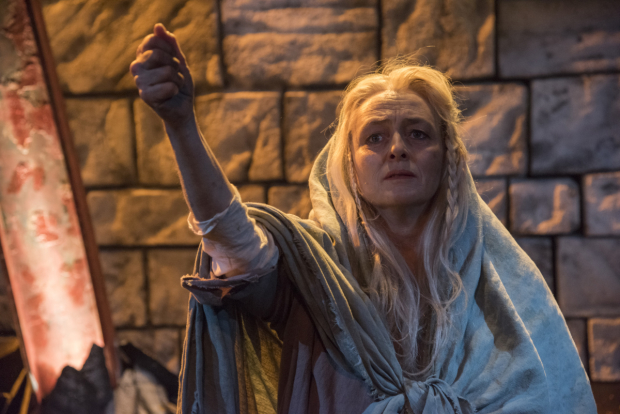The Testament of Mary

(© Andrew Brilliant/Brilliant Pictures)
In the final months of her life, Mary, the mother of Jesus, has something that she would like to say. She is not resigned and silent like in the paintings. No, she wants to be sure that her words matter and that they will be listened to. As part of its third annual Next Rep Black Box Festival, New Repertory Theatre is presenting an intimate and surprisingly arresting production of Colm Tóibín's play-turned-novella-turned-play, The Testament of Mary.
A fair amount of controversy has followed Tóibín's portrait of a devastated mother ever since its Broadway debut in 2013, where picketers could regularly be found lining West 48th Street. The show, which starred Fiona Shaw, shuttered after only two weeks of regular performances. This time around, a Catholic organization called America Needs Fatima (ANF) has sent along a petition containing over 30,000 signatures to New Repertory Theatre calling on this "blasphemous" production to be canceled. Except that there isn't anything blasphemous or insensitive about Tóibín's vivid and delicately written portrait of a grieving mother determined to tell her side of the story.
Mary, played here by a whimsical and earthy Paula Langton, is being watched closely by her minders, as she calls them, presumably writers of gospel. They want to be sure that not even Mary, mother of their supposed savior, will stand in the way of their writings. They have no time or patience for her raw and honest account of what happened. Still, Mary is left alone with the audience (in what looks like an ancient sealed cave designed by Ryan Bates) just long enough to tell her story. You need not be Catholic or well versed in matters of the Bible to appreciate what she has to say.
The trauma and heartbreak that has followed Mary since her son Jesus' death have rendered her unable to reference him by name. "The one who was here. The one who you are interested in," she says of him early in the play. Mary recounts painfully the incredulous rise of Jesus' celebrity, astonished by the frenzied crowds he drew, the misfits that began following him, and shocked when she first hears Jesus refer to himself as the son of God.
There is a gripping suspense to the play that begins when Mary notices that both she and her son are being watched, the first sign that something terrible is going to happen. (Dewey Dellay's haunting music and bold sound design are indispensible assets.) Though she warns him that he is being watched, Jesus ignores her warnings; he boldy (and very publicly) turns water into wine at a wedding in Cana. Mary isn't a believer though: She can't be sure that every jug contained only water. Her disbelief adds legitimacy and realness to the story, and it sets it apart from the religious mythology of the Gospels and the Bible.
The Testament of Mary shifts into emotional high gear when she discusses the "vast, fierce cruelty" of the crucifixion in lucid detail. Langton is at her very best as she breathtakingly conveys the anguish of a mother seeing her son in pain, dragging the cross on his back through the streets, a crown of thorns embedded in his skin. Once on the cross, it was not his face that Mary recognized as her son's, but his voice as he his cries of pain.
The biggest revelation for Mary, and the thing that she's grappled with all of these years later, is that she fled from her son's side before he died so that she could save herself, as they would have likely come for her next. She is haunted by her inability to have helped her son, and what seems strange to her now is how she was able to control herself. In every pained expression and guttural howl, Langton commands our attention in a performance of divine variety and stalwart precision.
Her minders are still watching carefully, though, and the play reaches a fascinating climax when Mary battles with them over their version of the events. They are even bold enough to explain to her what happened with Jesus' conception: "I know what happened," she reminds them. (This is left rather ambiguous.) They go on to explain that her son died so that mankind would be saved for eternal life and that his death has redeemed the world. She is floored by the enormity and the innocence of their belief, and in a moment of bitter release bellows, "I was there. It was not worth it."
At the heart of the play, Tóibín makes no overt claims about religion. Sharing more in common with Joan Didion's The Year of Magical Thinking, this is a captivating portrait of a grieving mother still haunted by great injustice and senseless violence. Over 2,000 years later, religion still divides the world, and catastrophic things are done in the name of God. In this work, we are able to draw tremendously satisfying parallels to today's world, which adds extra resonance to both the play and Mary's words. "How easily it might not have happened," Mary says late in the play. "It would not have taken much."











